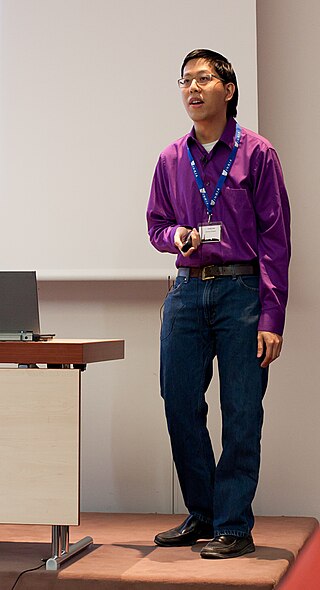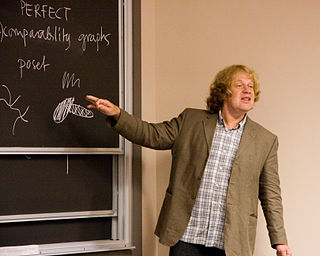Combinatorics is an area of mathematics primarily concerned with counting, both as a means and as an end to obtaining results, and certain properties of finite structures. It is closely related to many other areas of mathematics and has many applications ranging from logic to statistical physics and from evolutionary biology to computer science.

Richard Manning Karp is an American computer scientist and computational theorist at the University of California, Berkeley. He is most notable for his research in the theory of algorithms, for which he received a Turing Award in 1985, The Benjamin Franklin Medal in Computer and Cognitive Science in 2004, and the Kyoto Prize in 2008.

Kenneth Ira Appel was an American mathematician who in 1976, with colleague Wolfgang Haken at the University of Illinois at Urbana–Champaign, solved one of the most famous problems in mathematics, the four-color theorem. They proved that any two-dimensional map, with certain limitations, can be filled in with four colors without any adjacent "countries" sharing the same color.

Theoretical computer science is a subfield of computer science and mathematics that focuses on the abstract and mathematical foundations of computation.

Geometric group theory is an area in mathematics devoted to the study of finitely generated groups via exploring the connections between algebraic properties of such groups and topological and geometric properties of spaces on which these groups can act non-trivially.

Timothy Moon-Yew Chan is a Founder Professor in the Department of Computer Science at the University of Illinois at Urbana–Champaign. He was formerly Professor and University Research Chair in the David R. Cheriton School of Computer Science, University of Waterloo, Canada.

Christos Charilaos Papadimitriou is a Greek-American theoretical computer scientist and the Donovan Family Professor of Computer Science at Columbia University.

Kurt Mehlhorn is a German theoretical computer scientist. He has been a vice president of the Max Planck Society and is director of the Max Planck Institute for Computer Science.

John Robert Stallings Jr. was a mathematician known for his seminal contributions to geometric group theory and 3-manifold topology. Stallings was a Professor Emeritus in the Department of Mathematics at the University of California at Berkeley where he had been a faculty member since 1967. He published over 50 papers, predominantly in the areas of geometric group theory and the topology of 3-manifolds. Stallings' most important contributions include a proof, in a 1960 paper, of the Poincaré Conjecture in dimensions greater than six and a proof, in a 1971 paper, of the Stallings theorem about ends of groups.

János Pach is a mathematician and computer scientist working in the fields of combinatorics and discrete and computational geometry.
Marc Snir is an Israeli-American computer scientist. He holds a Michael Faiman and Saburo Muroga Professorship in the Department of Computer Science at the University of Illinois at Urbana-Champaign. He currently pursues research in parallel computing. He was the principal investigator (PI) for the software of the petascale Blue Waters system and co-director of the Intel and Microsoft-funded Universal Parallel Computing Research Center (UPCRC).
Piotr Indyk is Thomas D. and Virginia W. Cabot Professor in the Theory of Computation Group at the Computer Science and Artificial Intelligence Laboratory, Massachusetts Institute of Technology.
George Barry Purdy was a mathematician and computer scientist who specialized in cryptography, combinatorial geometry, and number theory. Purdy received his Ph.D. from the University of Illinois at Urbana–Champaign in 1972, officially under the supervision of Paul T. Bateman, but his de facto adviser was Paul Erdős. He was on the faculty in the mathematics department at Texas A&M University for 11 years, and was appointed the Geier Professor of computer science at the University of Cincinnati in 1986.

Roger Conant Lyndon was an American mathematician, for many years a professor at the University of Michigan. He is known for Lyndon words, the Curtis–Hedlund–Lyndon theorem, Craig–Lyndon interpolation and the Lyndon–Hochschild–Serre spectral sequence.

Rodney Graham Downey is a New Zealand and Australian mathematician and computer scientist, an emeritus professor in the School of Mathematics and Statistics at Victoria University of Wellington in New Zealand. He is known for his work in mathematical logic and computational complexity theory, and in particular for founding the field of parameterised complexity together with Michael Fellows.

Tandy Warnow is an American computer scientist and Grainger Distinguished Chair in Engineering at the University of Illinois at Urbana–Champaign. She is known for her work on the reconstruction of evolutionary trees, both in biology and in historical linguistics, and also for multiple sequence alignment methods.
David Eugene Muller was an American mathematician and computer scientist. He was a professor of mathematics and computer science at the University of Illinois (1953–92), after which he became an emeritus professor, and was an adjunct professor of mathematics at the New Mexico State University (1995–2008). Muller received his BS in 1947 and his PhD in 1951 in physics from Caltech; an honorary PhD was conferred by the University of Paris in 1989. He was the inventor of the Muller C-element, a device used to implement asynchronous circuitry in electronic computers. He also co-invented the Reed–Muller codes. He discovered the codes, and Irving S. Reed proposed the majority logic decoding for the first time. Furthermore, he invented Muller automata, an automaton model for infinite words. In geometric group theory Muller is known for the Muller–Schupp theorem, joint with Paul Schupp, characterizing finitely generated virtually free groups as finitely generated groups with context-free word problem.
In mathematics, the Muller–Schupp theorem states that a finitely generated group G has context-free word problem if and only if G is virtually free. The theorem was proved by David Muller and Paul Schupp in 1983.
Sariel Har-Peled is an Israeli–American computer scientist known for his research in computational geometry. He is a Donald Biggar Willett Professor in Engineering at the University of Illinois at Urbana–Champaign.

Ilya Kapovich is a Russian-American mathematician and a Professor of Mathematics at the Hunter College of the City University of New York. He is known for his contributions to geometric group theory, geometric topology, and complexity theory.













